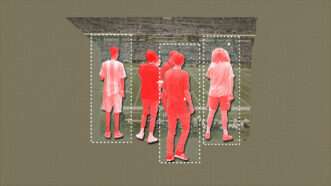Civil Liberties
Lawsuit Over Allegedly Discriminatory Denial of Permit to Display Nativity Scene in Park Can Go Forward
Nativity scene was allegedly excluded (ostensibly on COVID grounds) while a menorah lighting was allowed.
Racetrack Can Sue Alleging COVID Shutdown Enforcement Targeted Speech, Violated "Fruits of Their Labor Clause"
That’s the Fruits of Their Labor Clause of the North Carolina Constitution.
'María Knew She Was Being Targeted': The Arrest of a Venezuelan Activist Exposes Maduro's Brutal Crackdown
María Oropeza's arrest during a livestream highlights the dangers faced by opposition leaders in Venezuela and the regime's relentless efforts to silence dissent.
No Pseudonym for Ex-Pro-Basketball-Player Sexual Assault Defendant
"While this case involves a statutory conferral of anonymity, the legislature is not exempt from the Constitution."
Briefs Supporting Strong First Amendment Protection for K-12 Students' Outside-School Speech
The amicus briefs come from several organizations and people, some liberal (e.g., the ACLU), some conservative, and some apolitical.
North Carolina Threatened To Prosecute Her for Taking a 'Ballot Selfie.' Now, She's Suing.
Susan Hogarth posted a photo of her primary ballot. In North Carolina, that's against the law.
Limit Government's Use of Surveillance Technology Before It's Too Late
We can't stop technological advancement, but we should limit government misuse of it.
Free Speech Coalition Slaps Censorious E.U. Commissioner Who Threatened Elon Musk
The European Union is an engine of global control-freakery.
Michigan Judge Handcuffed and Jailed a Teen for Falling Asleep During a Field Trip
Judge Kenneth King is facing a lawsuit for punishing a 15-year-old who visited his courtroom with his "own version of Scared Straight.''
Unusual Fraud Claim Against Scientific Co-Author Over Alleged Research Problems Fizzles Out
The claim was brought too late, the court holds, and the associated defamation claim is barred by the judicial proceeding privilege.
Can Law Forbid Threatening Judges with Impeachment Because of Their Votes?
Donald Trump, Rick Perry, and more.
Can't Get Case Sealed Just Because "People Ask Me About [It]"
The plaintiff says she "thought the whole time it was going to be confidential"—but court cases are public.
First Amendment Doesn't Protect Speech That Solicits a Specific Crime
Calling for the burning of a particular mosque, for instance, or the bombing of a particular police station, or the killing of a particular person (politician, police officer, activist, or anyone else) may be constitutionally unprotected solicitation.
An Overorchestrated Rebellion: Dispatch From the DNC
An anticlimactic protest in Chicago reveals a tired approach to modern activism.
Neither Harris Nor Her Party Perceives Any Constitutional Constraints on Gun Control
The 2024 Democratic platform devotes five paragraphs to firearm restrictions but does not even allude to the Second Amendment.
Feds Seek 20-Year Sentence for Backpage Co-Founder Michael Lacey
It's an insane ask for someone convicted of just one nonviolent offense.
In Venezuela, Digital Freedom Is a Threat to Dictators
Now more than ever, people’s freedom lies in their ability to communicate and access information with privacy and security.
"There Is No Basis for Preventing the Public from Learning That Natale Seeks Recourse for the Defendants' Alleged Misconduct"
A reminder to libel plaintiffs (and other plaintiffs).
Court Reverses Injunction Against Anti-Anti-Semitic Speech Targeted at Neighbor
Galapo’s neighbor Oberholzer called him a “fucking Jew”; the Galapos “posted twenty-three signs” on their property, facing the Oberholzers’ property.
"Johns Hopkins University Articulates Restrained Approach to Issuing Public Statements"
"[T]he very idea of an 'official' position of the university on a social, scientific, or political issue runs counter to our foundational ethos ...."
The Anarchist Dreams: Dispatch From the DNC
Amid hopes for peace, chaos erupts as protesters clash with police and each other.
Illinois Falsely Accused These Parents of Abusing Their Baby—and Now Won't Tell Them Who Actually Did It
"I never thought that this was even humanly possible," says Sabra Brucker.
All Aboard the Vasectomy Van
Plus: Protesters at the DNC, anarcho-brat summer, V.C.s supporting Trump, and more...
Censoring the Internet Won't Protect Kids
Sen. Rand Paul makes the case against the Kids Online Safety Act.
The Feds Are Skirting the Fourth Amendment by Buying Data
The government needs a warrant to spy on you. So agencies are paying tech companies to do it instead.
Muted Outrage and Aspirational Crowds: Dispatch From the DNC
Early protests at the 2024 Democratic National Convention reveal uncertain momentum.
Baltimore's Tax Sales Are Robbing People of Their Equity
The Edmondson Community Organization accrued a modest property tax debt. The group paid dearly for that.
DNC Readies for Protesters
Plus: Ceasefire negotiations go haywire, free vasectomies and abortions from a van in Chicago, and more...
When Attacks on Anarchists Accidentally Improved Free Speech Law
After the crackdown on anarchists died down, it became more difficult to imagine anyone could go to jail in America solely for political heresy.
European and American Censors Want War With Elon Musk
Beware the Thierry Bretons of the world.
NFL's Facial Recognition Technology Sparks Fears of Fan Surveillance
Personal data retained by government or private entities are always at risk of compromise, misuse, or access by law enforcement.
Plaintiff Claims P. Diddy's Defamation Damaged Plaintiff's Drug Smuggling Business
Plaintiff says he was "always willing to set up business deals with the rich for drugs."
UCLA Appeals Yesterday's Preliminary Injunction That Ordered It to Avoid Repetition of Exclusion of Jewish or Pro-Israel Students from Parts of Campus
[UPDATE 8/23/24: UCLA has just dropped the appeal.]























